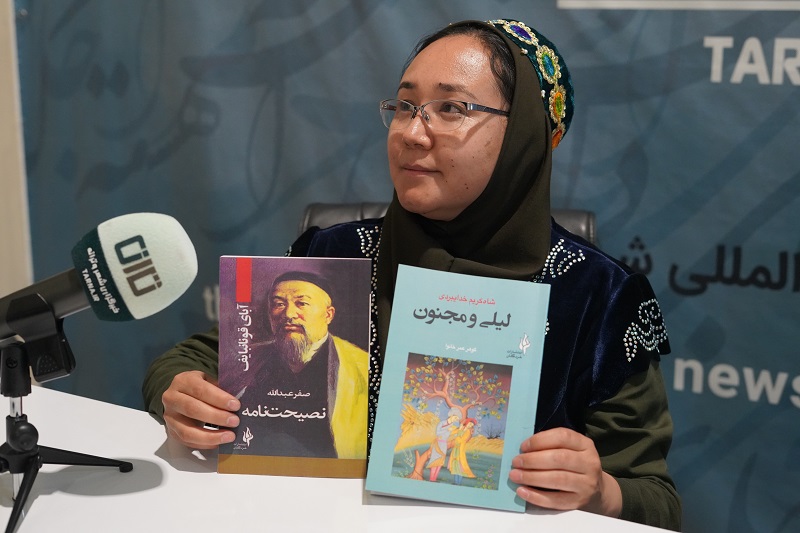Special Interview with the Female Translator, Iranologist, and Cultural Activist from Kazakhstan

Tehran - TARNA:According to the Iranian Poetry News Agency (Tarna), Gohar Omar Khanova, responsible for the Kazakhstan pavilion in the international section of the book fair, introduced books on Kazakh culture, literature, and history translated into English, Russian, Kazakh, and Persian.
Ms. Khanova, to get to know you better, could you tell us about your translation work and literary activities?
I am presenting two works at this exhibition. The first is the translation of Persian short poetry, or Haiku, into Kazakh, titled "A Moment," and the second is the translation of the Kazakh epic "Layli and Majnun" by Shah Karim Khudaiberdy into Persian. To further introduce Kazakh literature, I have brought a book titled "Advice Book" by the great Kazakh poet and philosopher Abay Qunanbayev, whom we in Kazakhstan refer to as Sage Abay. The "Advice Book" contains philosophical reflections on life and has been translated from Russian to Persian by Safar Abdullah.
Considering Kazakhstan's cultural space and its proximity to Iran, how familiar are Kazakh writers and poets with Iranian poets, especially the renowned ones, and have their works been translated into Kazakh?
All Commonwealth countries in Iran's cultural sphere are well-acquainted with the great classical poets of Iran. Before Kazakhstan's independence from the Soviet Union, the classic works of great Iranian poets were translated into Russian and made available to the public. After independence, countries related to Iranian culture, such as Uzbekistan, Tajikistan, and Kazakhstan, endeavored to break free from Russian cultural and linguistic influence. Specialists emerged to translate these valuable Persian works into their newly independent languages.
You have a good command of Persian and speak it fluently. Could you explain how you learned Persian and why you turned to translate Iranian literary works?
In school, we had a course called World Literature, which was divided into Eastern and Western literature. Persian literature was a mandatory part of Eastern literature, so Kazakh students gained a good, though not complete, familiarity with Persian language and literature, including major Iranian poets such as Saadi, Khayyam, Hafez, Ferdowsi, and Rumi. I was one of those students. Initially, I read these masters' works in Russian, but I wanted to read them in their original Persian to gain a better understanding. When I entered Al-Farabi University in Almaty, I chose the Faculty of Oriental Studies and the Department of Iranian Studies. Since 2001, I have been studying Persian in this department, continually expanding my knowledge of the language.
Given that Kazakhstan's cultural policy aims to de-Russify and return to its native Kazakh culture, and considering the good political and cultural relations between Iran and Kazakhstan, what are your thoughts on this? How have your experiences been in this regard?
After gaining independence, all the former Soviet Union countries, including Kazakhstan, aimed to revive their identity by returning to their native languages. We now strive to ensure that our language, literature, and arts, including cinema, align with the native Kazakh language. There has been a strong and problem-free relationship between Iran and Kazakhstan since our independence. The Iranian cultural attaché in Almaty's Iranian embassy actively participates in various festivals and exhibitions, including the book fair and handicrafts festivals. By participating in the Tehran International Book Fair, we hope to strengthen the cultural bridge between Kazakhstan and Iranian exhibitions.
Which Iranian poets and writers' works do you plan to translate in the future?
Many individuals are now proficient in Persian and work to convey Iranian literature to Kazakhstan. There is a deep and broad understanding of great Iranian poets in Kazakhstan. However, in Iran, there is little awareness of Kazakh literature, and Iranians are unfamiliar with Kazakh literary figures. I intend to work in this area, seeing it as my mission to translate Kazakh literature into Persian, thus acquainting the Iranian people with Kazakh culture and literature.
What is your view of Tarna as the world's first Persian poetry and song news agency, and how do you assess its performance?
When I first heard about Tarna, I thought its work and performance were highly significant. We always seek technology and consider digital advancements a part of human progress. However, the human spirit is refined by poetry and song, and one should always read books and keep reading as part of life. In reading, literature and poetry are crucial, providing a means to convey culture with ethics and elegance.
End Item/
Labels: TARNA POETRY ARTNEWS NEWS IRAN Iranian poets Tehran International Book Fair Iran Poetry News Agency Gohar Omar Khanova